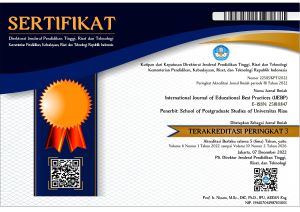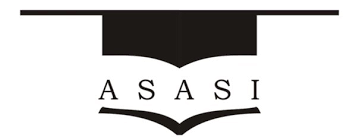THE APPLICATION OF THE PROBLEM-BASED LEARNING TEACHING MODEL IN IMPROVING STUDENTS' ABILITY TO SOLVE HIGHER ORDER THINKING SKILLS QUESTIONS
DOI:
https://doi.org/10.31258/ijebp.7.1.117-131Keywords:
Problem-Based Learning (PBL) Teaching Model, Higher Order Thinking Skills (HOTS) QuestionsAbstract
This study aimed to determine the increase in the ability to solve Higher Order Thinking Skills (HOTS) questions in the economics subject. This quantitative study employs a pre-experimental design with a pretest-posttest control group design. The instrument in this study used economic HOTS questions in the form of 15 multiple choice questions to determine the increase in ability to solve HOTS questions with the application of the Problem-Based Learning teaching model. It is known that the pre-test distribution data analysis obtained a mean of 58.64. In contrast, the post-test after being given a stimulus or treatment with the HOTS approach obtained a mean of 86.70, resulting in an increase in the results of the HOTS post-test after applying the Problem-Based Learning teaching
model. There is a significant difference through the results of the students' pre-test and post-test, as evidenced by the t-test obtained t-count > t-table (6.855 > 1.675) and the Wilcoxon Sign rank test, which produces a value (asym.sig.(2-tailed)) is 0.000 <0.05. Then, the results of hypothesis H0 are rejected, and H1 is accepted. It can be concluded that there is an effect after applying the Problem-Based Learning teaching model in increasing the ability to solve HOTS questions.
References
Agustika, P. M. (2020). Higher Order Thinking Ability in Solving HOTS Problems in Mathematics. Jurnal Ilmiah Sekolah Dasar Volume 4, Nomor 2, 257-266. https://ejournal.undiksha.ac.id/index.php/JISD/index
Agustin, M. (2021). Thinking Skills in the Context of 21st Century Learning (First; N. F. Atif, ed.). , Bandung: [email protected]
Amir, T. (2015). Educational Innovation Through Problem-Based Learning: How Educators Empower in the Knowledge Age (Fourth). Jakarta: Prenadamedia Group. Retrieved from www.prenadamedia.com
Banyal, N. (2021). The Problem Based Learning Model Improves Student Learning Outcomes in Material Price Index and Inflation for High School Students. Journal for Lesson and Learning Studies Volume 4, Number 2, 189-194. https://ejournal.undiksha.ac.id/index.php/JLLS
Fanani, M. Z. (2018). Strategy for Developing Higher Order Thinking Skills (HOTS) in the 2013 Curriculum. Journal of Islamic Religious Education Vol.II, No.1, 57-76. https://doi.org/10.30762/ed.v2i1.582
Helmawati. (2019). HOTS-Based Learning and Assessment (First; P. Latifah, ed.). PT Remaja Rosdakarya. Retrieved from www.rosda.co.id
Husnidar, H., & Hayati, R. (2021). Application of the Problem Based Learning Models to Improve Students' Mathematics Learning Outcomes. Asimetris: Journal of Mathematics And Science Education, 2(2), 67–72.https://doi.org/10.51179/asimetris.v2i2.811
Jakni. (2016). Experimental Research Methodology in the Field of Education (First). Bandung: Penerbit Alfabeta. Retrieved from www.cvalfabeta.com
Kurniawati, F. N. (2022). Reviewing the Problems of Low Quality of Education in Indonesia and Solutions. AoEJ: Academy of Education Journal, Vol.13 Nomor 1, 1-12. https://doi.org.10.47200/aoej.v13i1.765
Lider, G. (2022). Application of the Quizizz Application Assisted Problem Based Learning Learning Models to Improve Mathematics Learning Achievement of Class VI Semester I Elementary Schools Negeri 5 Sangsit. Indonesian Journal of Educational Development, 3(1), 189–198. https://doi.org/10.5281/zenodo.6575177
Mawardi, A. V. (2020). Analysis of Students Thinking Processes in Solving HOTS Problems in View of Cognitive Style. JRPM (Jurnal Review Pembelajaran Matematika), 40-52. https://doi.org/10.15642/jrpm.2020.5.1.40-52
Nasution, M. S. (2019). Increasing the Quality of HOTS-Based Learning and Assessment. PRODIKMAS: Jurnal Hasil Pengabdian Kepada Masyarakat, Volume 4, Nomor 1, 40-47. https://doi.org/10.30596/jp.v4i1.6145
Ngalimun. (2017). Learning Strategies. Yogyakarta: Penerbit Parama Ilmu. Retrieved from https://opac.perpusnas.go.id/DetailOpac.aspx?id=1162294
Nyova Fazriani, d. (2019). The Effect of the Higher Order Thinking Skill (HOTS) Approach on the Reading Skills of Class X Students of SMK Negeri 3 Sukabumi City. STILISTIKA Vol. 12 No.2, 124-137. http://dx.doi.org/10.30651/st.v12i2.2802
Rahmayanti, E. (2017). Application of Problem Based Learning in Improving Students' Critical Thinking Skills in Pancasila and Citizenship Education Learning Class XI SMA. Proceedings of the National Citizenship Conference III P-ISSN 2598-5973, (November), 242–248. Retrieved from http://eprints.uad.ac.id/9787/
Rumini, S. (2020). PBL: Problem Based Learning (Problem Based Learning) Assisted by Picture Media in Middle School Social Studies Learning (First; Z. Arifin, ed.). Bandung: Penerbit Adab. Retrieved from http://www.penerbitadab.id
Sugiyono. (2019). Educational https://cvalfabeta.com Research Methods. Bandung: Alfabeta.
Suluh, M. (2018). National Education Perspective. Jurnal Penelitian dan Pengkajian Ilmu Vol. 2 No. 1 December 2018, 1-9. https://doi.org/10.36312/e-saintika.v2i1.78
Tanujaya, B. (2021). HOTS in Mathematics Learning (First; Monalisa, ed.). Depok: PT Rajagrafindo Persada. Retrieved from http://www.rajagrafindo.co.id
Widoyoko, E. P. (2020). Research Instrument Preparation Techniques (eighth). Yogyakarta: Pustaka Pelajar. Retrieved from www.pustakapelajar.co.id





